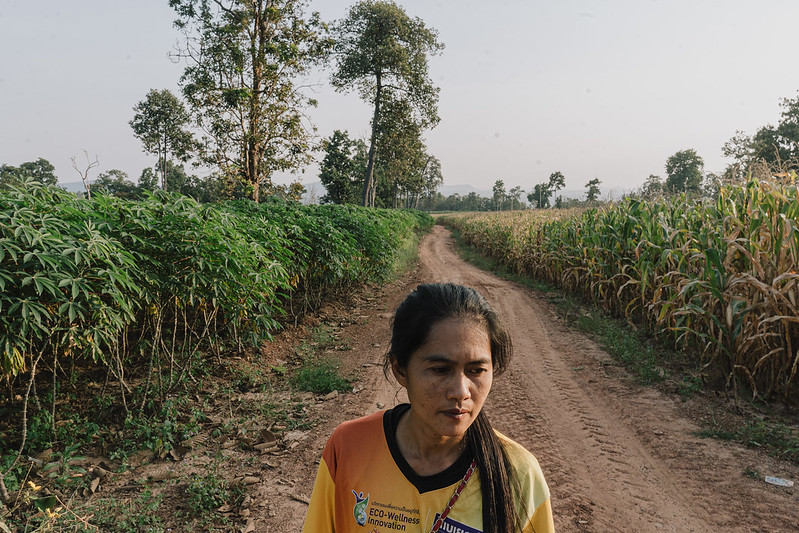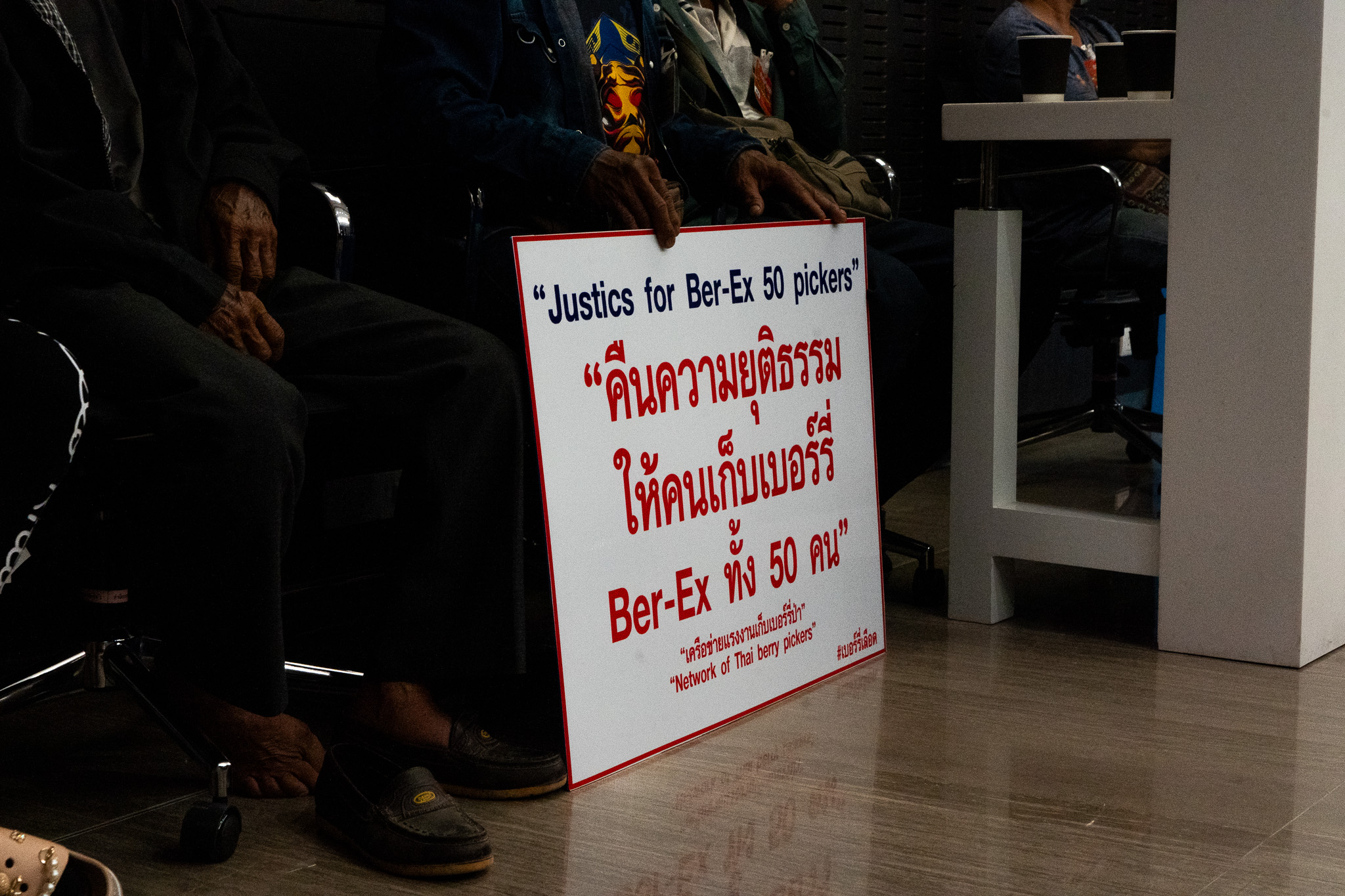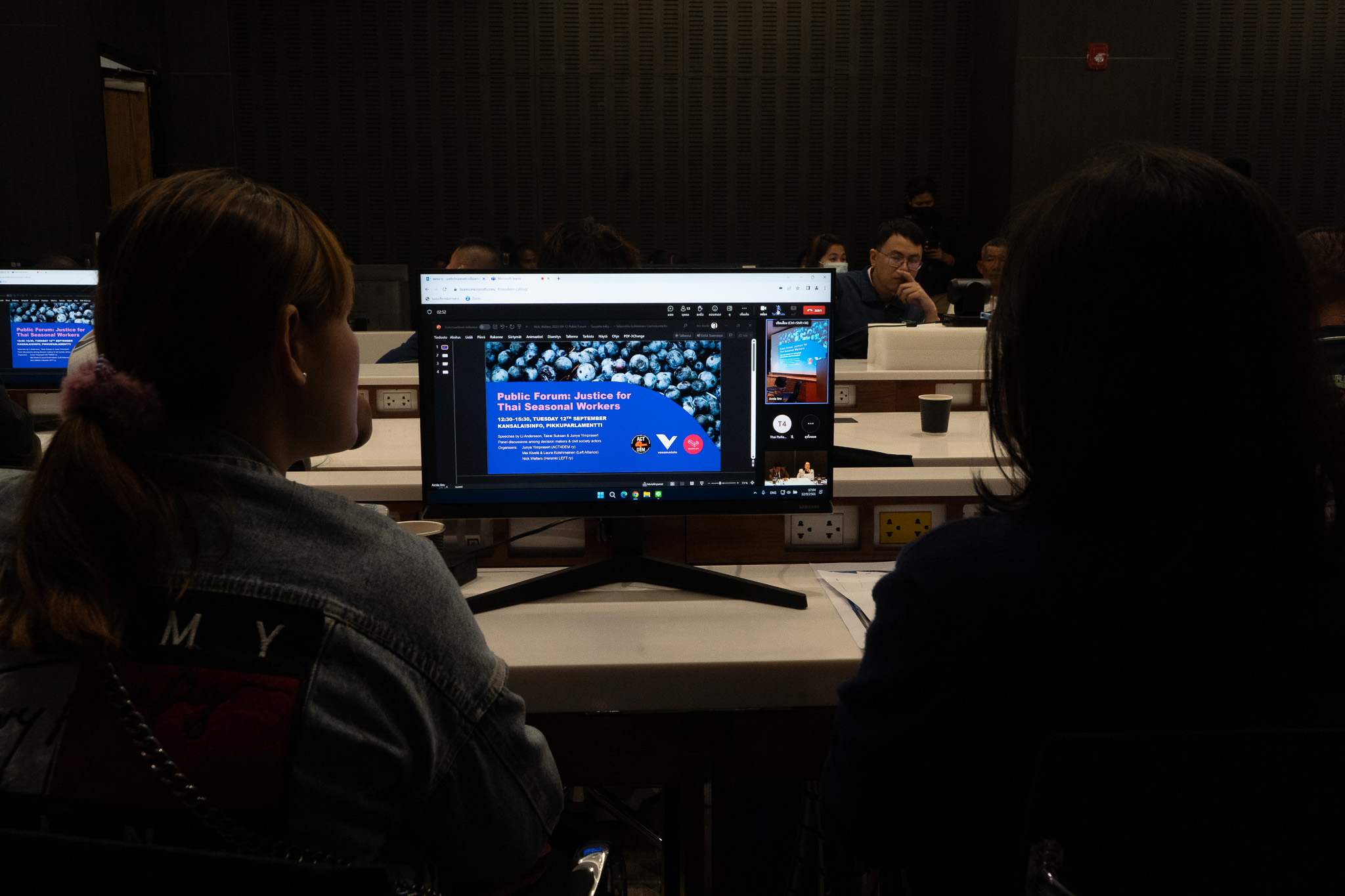Den Khamlae had been a prominent land rights activist in Chaiyaphum province for the past three decades. Until he suddenly disappeared in April 2016.
Guest contribution by Zac Cooper, Caroline Van Buskirk and Praveena Fernes
KHOK YAO, CHAIYAPHUM – At noon on a sultry day last month, Suphap Khamlae heard a knock on her door from a friend. While out looking for food in the forest, he had stumbled across something strange.
Filled with a sense of foreboding, Suphap asked some other villagers to accompany her to the area.
The five of them walked two kilometers through the forest to the somber site.
At the very first glance, Suphap knew what she saw were his. “My heart sank,” she says.
She recognized the fertilizer bag he had fashioned into a sack he carried for his journeys into the forest. She knew it was her own stitching in the shirt. Although she had assumed it for some time, there was finally evidence to support her worst nightmare: her husband, villager leader, and land rights activist Den Khamlae, was dead.

A skull was found beside Den’s belongings on a path that its finder takes everyday to scavenge for food. Community members are still waiting for forensics to confirm their fears – Den’s disappearance and death.
This gave a semblance of closure, but even more questions arose.
Eleven months earlier, Den walked into the Khok Yao Forest which is located in between Chaiyaphum Province’s Phu Sam Phak Nam Reserve Forest and Phu Khiau Wildlife Sanctuary in Loei Province.
On the day of his disappearance, Den and his wife had spent the morning at the local market before returning home. While his wife stayed at home, Den left his house around 9 a.m. Carrying sticky rice, drinking water, a knife, a shovel, and his homemade sack, Den headed in the direction of the Phu Khiau Wildlife Sanctuary. His two dogs walked with him.
Around 3 p.m. the same day, one of the dogs returned, and the other later that night. But there was no sign of Den. One of the dogs had scars on his body, prompting concern. Some villagers in Khok Yao claimed they heard a gunshot at around 10 p.m.
Since that day on April 16, 2016 there has been no sign of Den.

Suphap Khamlae stands next to a picture of her husband, Den – a man who is praised for his sincerity, directness, generosity, courage, and self-discipline by those close to him
Two days later, Suphap, Khok Yao villagers, Phu Khiau Wildlife Sanctuary officers, and a team from the local administration formed a search party for Den, checking areas along his normal route, but found no evidence of any incident.
Suphap, who goes by the nickname, Phap, contacted the police on April 18, 2016, but was told that the Royal Forestry Department (RFD) was responsible for reporting the case. Her attempts to have the RFD make a search were denied as the area was not under that branch’s jurisdiction, but rather the wildlife sanctuary’s jurisdiction.
Early this month, the community hosted a two-day forum to memorialize Den. The first half focused on his life and leadership in the community’s fight for land reform. The remainder of the forum was centered around repeated human rights violations, namely the issues of forced disappearances in Thailand.

Pramote Pholpinyo of the Isaan Land Reform Network speaks about Den’s legacy at a memorial event on May 7 and 8, 2017 in Chaiyaphum Province.
Living for a struggle
Den was a fighter all his life.
Born in 1951 in Udon Thani Province, he is remembered for not letting anything stop him. As a boy, he did not let the frequent flooding near his home stop him from getting to school: sometimes he would swim to school if necessary. After graduating from compulsory fourth grade, he picked up muay thai, or Thai boxing, occasionally winning five baht on a fight.
The Communist Party of Thailand (CPT) extended their rebellion against the Thai state into the forested area in Udon Thani Province in the early 1970s. When Den joined them at age 22, he believed he was joining an organization that was pushing to create a more equitable society.
Like other young men his age, Den liked to go out, drink, and meet new people. He had first made contact with the CPT when he met individuals who had just left the forest the spread their organizational goals.
When Den joined the CPT, he was given the alias Comrade Dao, or Star. Later, the name Ee Poom (Tadpole) was added on the end, because he liked to spend time catching tadpoles in the forest. From then on he went by the name Comrade Tadpole Star.
From 1975 to 1977, he attended the communist movement’s political trainings in Laos and Cambodia. These training not only focused on political education, but also emphasized guerilla warfare tactics.
His sister notes that after Den’s experience abroad, he seemed more calm and collected. He had been trained as a soldier, but he also gained skills in community organization that he would use throughout his life.
The CPT moved Den to a forested area not far from Khok Yao. By 1977, half of the provinces in the country were considered “communist infiltrated” by the Thai government. However, with changing diplomatic relations with China, Vietnam, and Cambodia and intraorganizational disagreements, the CPT started to weaken. With the 1982 government order 65/2525, which offered amnesty to all CPT fighters, there was a massive defection between 1982 and 1983, including Den.
Den never truly left the CPT struggle, but he did leave the forest to pursue a farming life. Even with his change in lifestyle, he still maintained a connection to the communist fighters and would sometimes spend days back in the forest.
Many of Den’s friends and fellow CPT defectors settled in the Khok Yao area in the early 1980s, so Den started to spend time there as a paid laborer. After marrying Phap, he worked his stepfather’s land, growing red beans and corn.

Led by Den’s sister, his CPT comrades sing a communist anthem in remembrance of their lost friend.
Land Reform Movement
Khok Yao Village has only existed since 1954 but since that time, villagers have become fully rooted in the area. But over the past few decades, the community has been struggling against government policies that threatened the community’s livelihood.
In the 1980s, the RFD started attempts to increase Thailand’s forest cover. Certain areas were designated as reserve forests or national parks. Since this land was officially “owned” and protected by the government, the RFD pushed for the eviction of people who had been living there before the new land designation.
But the people and their livelihoods were in the way.
The first major threat to Khok Yao came with the 1985 government program entitled “Village Preserves Forest, People Preserve Animals.” The RFD planted eucalyptus trees on the land farmed by the villagers. These trees economically benefit the government, while drawing water out of the soil and thus degrading farmers’ land.
Initially, the RFD tried to coax them off of their land. A RFD unit announced each displaced family would be given 15 rai (about six acres) of farmland and another two rai to build houses on, in an area 70 kilometers away. Families accepting the deal arrived to the new area only to discover the land promised was already being worked by other farmers.
Discovering that even this poor consolation prize was deceitful made villagers even more distrustful of the government’s motives. Without any land to work on, many families splintered under financial and emotional pressure.
Meanwhile, villagers living and farming within the reserve forest were subject to threats and arrests. Often, their possessions and property were destroyed.
Some families decided to move elsewhere, while a few families decided to stay and fight to gain the right to use the land. At this time, the Khok Yao community stabilized at around 30 households with 800 rai of land total. Den and Phap were amongst those who decided to stay.
Some people were no longer able to work their land openly because the area was guarded by army rangers and RFD officers. Den worked as a rice farm laborer by day, and by night he sneaked back to plant crops while the eucalyptus trees were still young.
In 2004, Den and other villagers joined the Isaan Land Reform Network (ILRN), an informal alliance of villagers, lawyers, reporters, and activists working towards land reform throughout Isaan. The ILRN gives villagers a greater sense of their rights in addition to increased knowledge of their land’s history.
Den became the leader of the Khok Yao village group in 2008, making him responsible for funneling the needs of the community into policy proposals to the government.
In July 2011, RFD officers and police arrested ten people from Khok Yao village, including Den and his wife, for trespassing reserve forest land. After 12 days in jail, they were released on bail with the help of an ILRN lawyer.
Insecurity for villagers has worsened since a military dictatorship came into power in May 2014. In August of that year, RFD officers put up a sign in Khok Yao village giving villagers 15 days notice to move out their homes.
The villagers protested against the order and eventually the eviction was postponed. But early last year, the forest resource management office in Nakhon Ratchasima sent a letter to Den’s family and other villagers. It declared that villagers officially had to relocate.
Den appealed the order to the Minister of the Ministry of Natural Resources and Environment. Since that time, Den split his time in two ways: working with the people’s network to fix the problems of Khok Yao village and making a living with his wife.
Making a change
Den’s push for land reform in the Khok Yao area comprised most of his life. Even though the struggle for villager land rights continues to this day, Den was integral in organizing villagers and negotiating with government officials.
The Khok Yao community considered Den great leader and his presence gave villagers stability in their unstable situations.
Phap stated that Den’s greatest values were “his farm land, his life. Demanding the rights for the people. Even with no kids, he wants to make sure that the next generation has land to work on.”
The drawback of being such a selfless leader was that Den took a lot of the struggle on himself. He was always willing to trade places for other people when going to meetings, even though he did not have much money to pay for the travel costs. Den wanted to make sure he was doing all he could to support the community.
But years of struggling took a toll on Den’s will to fight. Before his disappearance he complained to his friend about how tired he was and that he was not sure he could go on.

The forums organizers raised funding by selling T-shirts, booklets that detail the events following Den’s disappearance.
The government’s forced disappearance act
At the forum in Chaiyaphum Province, his family, activists, lawyers, and academics honored the legacy of Den by recounting his early life while weaving in moments that reflected his humanity and exemplary leadership. Speakers also shared in hope, successes, and challenges in bringing justice for marginalized groups forced to relocate to accommodate large scale state projects.
Behind each speaker at the forum is Den’s face, plastered three feet high on a memorial poster. He has become a larger-than-life figure for the land reform movement in the Northeast.
Discussion at the forum also highlighted the danger activists face. What happened to Den has happened to other local activists. An Amnesty International report released earlier this year expressed concern, saying “Enforced disappearances continue to be reported and there has been no significant progress in investigations.”
Another example of a recent forced disappearance was that of a prominent Karen land activist Porlajee Rakchongcharoen in 2014, also known as Billy. He had been working with Karen villagers who alleged that the local government offices were responsible for destroying and burning properties of more than 20 Karen families.
Enforced disappearance cases are often underreported in Thailand, mostly due to a lack of sufficient forms of protection from retaliation against witnesses. According to Thai law, enforced disappearance is not a criminal offense, which is why it is imperative to raise awareness of this issue and shed more light on the suffering of those affected by it.
Brad Adams, the Asia Director for Human Rights Watch, stated that, “The Thai government should finally ratify the disappearances convention and enact the criminal law needed to fully prosecute officials responsible for heinous crimes…After years of waiting, more promises are simply not enough. The government needs to take swift and concrete action to enact a law that severely penalizes torture and enforced disappearance.”
Zac Cooper is a student at Vanderbilt University in Nashville, Tennessee where he studies human and organizational development. Caroline Van Buskirk is a child development major at Penn State University. Praveena Fernes is a public health student at Tulane University. The three are in Khon Kaen studying about development issues.





